Items filtered by date: October 2023
Foot Problems in the Elderly Population
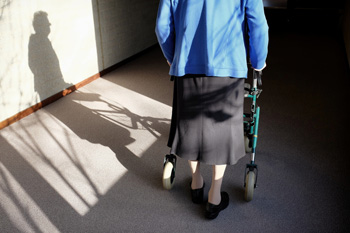
The elderly are more prone to foot problems due to a combination of age-related physical changes, accumulated wear and tear, and other health factors. As people age, the skin becomes thinner, less elastic, and loses its natural oils, making it more susceptible to dryness, cracking, and infections. The fat pads on the bottom of the feet, which provide cushioning, tend to thin out, leading to decreased shock absorption and increased sensitivity to pressure points. Additionally, circulation can diminish, slowing down the healing process and increasing the risk of infections. Over time, joints can become stiff and lose their range of motion due to conditions such as arthritis. Chronic diseases including diabetes can also have significant effects on foot health, increasing vulnerability to nerve damage and poor circulation. Years of bearing body weight and wearing various types of footwear can result in structural changes like bunions, hammertoes, and collapsed arches. If you are elderly or taking care of an older person, it is suggested that you routinely schedule appointments with a podiatrist for examinations and regular foot care.
Proper foot care is something many older adults forget to consider. If you have any concerns about your feet and ankles, contact Donald Manger, DPM from Associated Podiatric Physicians, PA. Our doctor can provide the care you need to keep you pain-free and on your feet.
The Elderly and Their Feet
As we age we start to notice many changes in our body, but the elder population may not notice them right away. Medical conditions may prevent the elderly to take notice of their foot health right away. Poor vision is a lead contributor to not taking action for the elderly.
Common Conditions
- Neuropathy – can reduce feeling in the feet and can hide many life-threatening medical conditions.
- Reduced flexibility – prevents the ability of proper toenail trimming, and foot cleaning. If left untreated, it may lead to further medical issues.
- Foot sores – amongst the older population can be serious before they are discovered. Some of the problematic conditions they may face are:
- Gouging toenails affecting nearby toe
- Shoes that don’t fit properly
- Pressure sores
- Loss of circulation in legs & feet
- Edema & swelling of feet and ankles
Susceptible Infections
Diabetes and poor circulation can cause general loss of sensitivity over the years, turning a simple cut into a serious issue.
If you have any questions please feel free to contact our office located in Hamilton Township, NJ . We offer the newest diagnostic and treatment technologies for all your foot and ankle needs.
Treatment Options for Ingrown Toenails
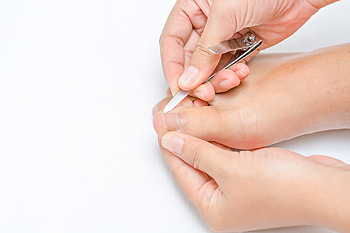
Ingrown toenails are a common condition in which the corner or side of a toenail grows into the soft flesh. The result is pain, inflamed skin, swelling and, sometimes, an infection. Ingrown toenails, which most commonly affect the big toe, can be painful and frustrating, but the good news is that there are several effective treatment options available to alleviate the discomfort and promote healing. Ingrown toenails often result from improper nail care, wearing tight-fitting shoes, or trauma to the toe. Cutting your nails too short or rounding the edges instead of trimming them straight across can also increase the risk. Find shoes that have a wider toe box, to avoid having the toes squeezed too tightly. If ingrown toenails develop frequently, custom orthotic devices also can help redistribute pressure on the toes. A podiatrist may prescribe antibiotics to treat or prevent infection. In more severe cases, a podiatrist may need to remove a portion of the ingrown toenail to promote healthy nail growth. If you are suffering from the pain of an ingrown toenail, it is suggested that you make an appointment with a podiatrist for proper diagnosis and treatment.
Ingrown toenails may initially present themselves as a minor discomfort, but they may progress into an infection in the skin without proper treatment. For more information about ingrown toenails, contact Donald Manger, DPM of Associated Podiatric Physicians, PA. Our doctor can provide the care you need to keep you pain-free and on your feet.
Ingrown Toenails
Ingrown toenails are caused when the corner or side of a toenail grows into the soft flesh surrounding it. They often result in redness, swelling, pain, and in some cases, infection. This condition typically affects the big toe and may recur if it is not treated properly.
Causes
- Improper toenail trimming
- Genetics
- Improper shoe fitting
- Injury from pedicures or nail picking
- Abnormal gait
- Poor hygiene
You are more likely to develop an ingrown toenail if you are obese, have diabetes, arthritis, or have any fungal infection in your nails. Additionally, people who have foot or toe deformities are at a higher risk of developing an ingrown toenail.
Symptoms
Some symptoms of ingrown toenails are redness, swelling, and pain. In rare cases, there may be a yellowish drainage coming from the nail.
Treatment
Ignoring an ingrown toenail can have serious complications. Infections of the nail border can progress to a deeper soft-tissue infection, which can then turn into a bone infection. You should always speak with your podiatrist if you suspect you have an ingrown toenail, especially if you have diabetes or poor circulation.
If you have any questions, please feel free to contact our office located in Hamilton Township, NJ . We offer the newest diagnostic and treatment technologies for all your foot care needs.
Why Do I Have Foot Pain?
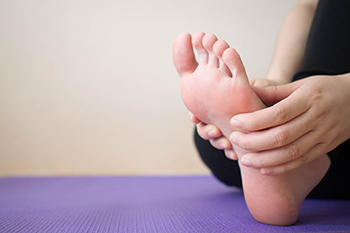
Foot pain is a common complaint that can have various origins, making it necessary to pinpoint the underlying cause for effective treatment. One common culprit is overuse or strain, often seen in athletes or individuals who spend long hours on their feet. Arthritis, both osteoarthritis and rheumatoid arthritis, can trigger pain by causing inflammation and joint damage in the feet. Footwear plays a significant role and wearing ill-fitting shoes or high heels can lead to pain and discomfort. Additionally, flat feet or high arches can cause biomechanical imbalances, leading to pain. Infections, such as athlete's foot or fungal nail infections, can be a source of discomfort. Nerve issues consisting of neuropathy, can also manifest as foot pain. Trauma or injuries, like sprains, fractures, or torn ligaments, require immediate attention. Diabetes related complications can contribute to nerve and circulation problems leading to chronic foot pain. Identifying the specific cause of foot pain is essential for targeted treatment and relief. If you have any type of foot pain, it is suggested that you make an appointment with a podiatrist who can determine what the cause is, and offer you correct treatment methods.
Foot Pain
Foot pain can be extremely painful and debilitating. If you have a foot pain, consult with Donald Manger, DPM from Associated Podiatric Physicians, PA. Our doctor will assess your condition and provide you with quality foot and ankle treatment.
Causes
Foot pain is a very broad condition that could be caused by one or more ailments. The most common include:
- Bunions
- Hammertoes
- Plantar Fasciitis
- Bone Spurs
- Corns
- Tarsal Tunnel Syndrome
- Ingrown Toenails
- Arthritis (such as Gout, Rheumatoid, and Osteoarthritis)
- Flat Feet
- Injury (from stress fractures, broken toe, foot, ankle, Achilles tendon ruptures, and sprains)
- And more
Diagnosis
To figure out the cause of foot pain, podiatrists utilize several different methods. This can range from simple visual inspections and sensation tests to X-rays and MRI scans. Prior medical history, family medical history, and any recent physical traumatic events will all be taken into consideration for a proper diagnosis.
Treatment
Treatment depends upon the cause of the foot pain. Whether it is resting, staying off the foot, or having surgery; podiatrists have a number of treatment options available for foot pain.
If you have any questions, please feel free to contact our office located in Hamilton Township, NJ . We offer the newest diagnostic and treatment technologies for all your foot care needs.
Arthritis Can Cause Pain in the Feet and Ankles
Causes and Strategies for Treatment of Stress Fractures
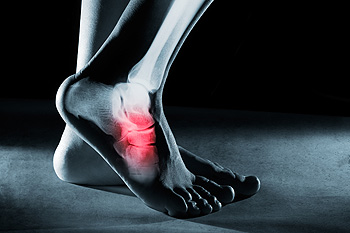
Stress fractures, although often seen as minor injuries, can lead to significant discomfort and prolonged recovery if not addressed properly. Understanding the causes and seeking timely treatment are essential steps toward a smoother healing process. One of the primary causes of these hairline fractures is repetitive stress and overuse, particularly common among athletes and those engaged in high-impact activities. The constant pounding on the bones, such as during running, can weaken them over time, eventually resulting in a fracture. Insufficient rest between activities or abrupt increases in intensity or duration can increase the risk. Identifying stress fracture symptoms is important for early intervention. Pain, localized tenderness, and swelling are common signs, typically worsening with activity and subsiding with rest. Treatment often involves rest, immobilization with a brace or cast, and sometimes crutches are used to reduce weight-bearing. By recognizing the causes and seeking appropriate treatment, individuals can recover from stress fractures more quickly and minimize the risk of recurrence. If you have endured a stress fracture, it is suggested that you consult a podiatrist who can effectively diagnose and guide you toward the correct treatment options.
Stress fractures occur when there is a tiny crack within a bone. To learn more, contact Donald Manger, DPM from Associated Podiatric Physicians, PA. Our doctor can provide the care you need to keep you pain free and on your feet.
How Are They Caused?
Stress fractures are the result of repetitive force being placed on the bone. Since the lower leg and feet often carry most of the body’s weight, stress fractures are likely to occur in these areas. If you rush into a new exercise, you are more likely to develop a stress fracture since you are starting too much, too soon. Pain resulting from stress fractures may go unnoticed at first, however it may start to worsen over time.
Risk Factors
- Gender – They are more commonly found in women compared to men.
- Foot Problems – People with unusual arches in their feet are more likely to develop stress fractures.
- Certain Sports – Dancers, gymnasts, tennis players, runners, and basketball players are more likely to develop stress fractures.
- Lack of Nutrients – A lack of vitamin D and calcium may weaken the bones and make you more prone to stress fractures
- Weak Bones – Osteoporosis can weaken the bones therefore resulting in stress fractures
Stress fractures do not always heal properly, so it is important that you seek help from a podiatrist if you suspect you may have one. Ignoring your stress fracture may cause it to worsen, and you may develop chronic pain as well as additional fractures.
If you have any questions, please feel free to contact our office located in Hamilton Township, NJ . We offer the newest diagnostic and treatment technologies for all your foot care needs.
Symptoms of Arthritis in the Feet
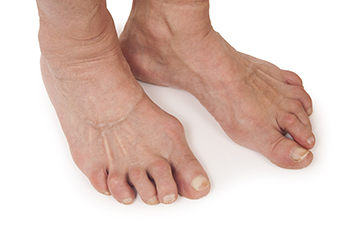
Arthritis is a common condition that affects millions of people worldwide, and it can manifest in various parts of the body, including the feet and ankles. If you have been experiencing persistent discomfort or pain in your lower extremities, it is essential to understand the signs and symptoms of arthritis in the feet and ankles, and to seek timely treatment. One of the earliest symptoms is pain, often accompanied by stiffness in the affected joints. Arthritis can make simple activities such as walking or climbing stairs painful. Inflammation is common in patients who have arthritis, leading to noticeable swelling and redness around the affected joints, especially after prolonged periods of activity. Arthritis can also cause decreased flexibility and range of motion in the feet and ankles, making it difficult to move them as freely as before. In some cases, chronic arthritis can result in joint deformities, such as bunions or hammer toes. As arthritis progresses, it can significantly affect your ability to walk comfortably and may lead to limping. If you are experiencing any of these symptoms, it is suggested that you make an appointment with a podiatrist for a proper diagnosis and tailored treatment plan.
Arthritis can be a difficult condition to live with. If you are seeking treatment, contact Donald Manger, DPM from Associated Podiatric Physicians, PA. Our doctor can provide the care you need to keep you pain-free and on your feet.
Arthritic Foot Care
Arthritis is a term that is commonly used to describe joint pain. The condition itself can occur to anyone of any age, race, or gender, and there are over 100 types of it. Nevertheless, arthritis is more commonly found in women compared to men, and it is also more prevalent in those who are overweight. The causes of arthritis vary depending on which type of arthritis you have. Osteoarthritis for example, is often caused by injury, while rheumatoid arthritis is caused by a misdirected immune system.
Symptoms
- Swelling
- Pain
- Stiffness
- Decreased Range of Motion
Arthritic symptoms range in severity, and they may come and go. Some symptoms stay the same for several years but could potentially get worse with time. Severe cases of arthritis can prevent its sufferers from performing daily activities and make walking difficult.
Risk Factors
- Occupation – Occupations requiring repetitive knee movements have been linked to osteoarthritis
- Obesity – Excess weight can contribute to osteoarthritis development
- Infection – Microbial agents can infect the joints and trigger arthritis
- Joint Injuries – Damage to joints may lead to osteoarthritis
- Age – Risk increases with age
- Gender –Most types are more common in women
- Genetics – Arthritis can be hereditary
If you suspect your arthritis is affecting your feet, it is crucial that you see a podiatrist immediately. Your doctor will be able to address your specific case and help you decide which treatment method is best for you.
If you have any questions, please feel free to contact our office located in Hamilton Township, NJ . We offer the newest diagnostic and treatment technologies for all your foot care needs.

